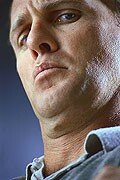- 8 Ways to Increase Dopamine Naturally
- 7 Best Breads for Maintaining Stable Blood Sugar
- Gelatin vs. Collagen: Which is Best for Skin, Nails, and Joints?
- The Long-Term Effects of Daily Turmeric Supplements on Liver Health
- Could Your Grocery Store Meat Be Causing Recurring UTIs?
- Are You Making This Expensive Thermostat Error This Winter?
- Recognizing the Signs of Hypothyroidism
- 10 Strategies to Overcome Insomnia
- Could Artificial Sweeteners Be Aging the Brain Faster?
- Techniques for Soothing Your Nervous System
FDA Approves Injected Drug for ‘Double Chin’


The U.S. Food and Drug Administration on Wednesday approved an injected drug to help aging Americans plagued what’s commonly known as the “double chin.”
The drug, Kybella, contains deoxycholic acid, which the FDA says is “produced in the body [and] helps the body absorb fat.” Kybella has been approved by the agency to treat adults with moderate-to-severe fat below the chin.
“Treatment with Kybella should only be provided by a licensed health care professional, and patients should fully understand the risks associated with use of the drug before considering treatment,” Dr. Amy Egan, deputy director of the Office of Drug Evaluation III at the FDA’s Center for Drug Evaluation and Research, said in an agency news release.
Just in case consumers contemplate using Kybella on other fat-prone parts of the body, Egan stressd that “Kybella is only approved for the treatment of fat occurring below the chin, and it is not known if Kybella is safe or effective for treatment outside of this area.”
According to the FDA, Kybella, made by Califonia-based Kythera Biopharmaceuticals, is injected into fat tissue under the chin.
“Patients may receive up to 50 injections in a single treatment, with up to six single treatments administered no less than one month apart,” the agency said.
The drug shouldn’t be diluted or mixed with other compounds, and its use is not without risk. That’s because when it is improperly used, Kybella can destroy non-fat cells along with fat cells, the FDA said.
“Kybella can cause serious side effects, including nerve injury in the jaw that can cause an uneven smile or facial muscle weakness, and trouble swallowing,” the FDA warned.
“The most common side effects of Kybella include swelling, bruising, pain, numbness, redness and areas of hardness in the treatment area,” the FDA said. People who’ve had prior plastic or other surgery in the area around the chin should only use Kybella with caution, the agency added.
The FDA also warned consumers about counterfeit forms of Kybella. The drug “is being distributed in a dispensing pack that has a unique hologram on the vial label. If there is no hologram, do not use the product,” the agency said.
More information
Find out more about surgeries to lift the area below the chin at the American Society of Plastic Surgeons.
Source: HealthDay
Copyright © 2026 HealthDay. All rights reserved.










